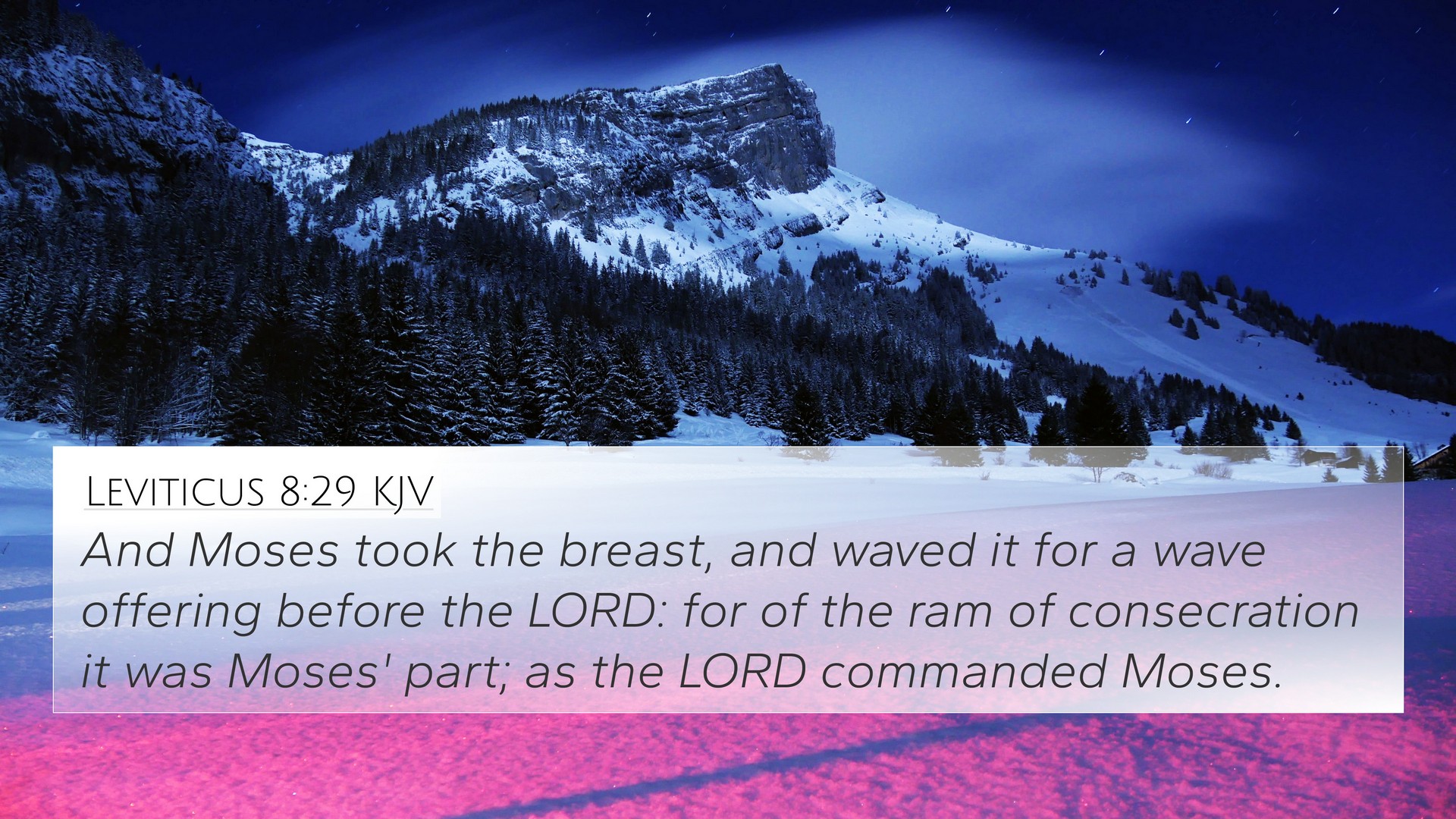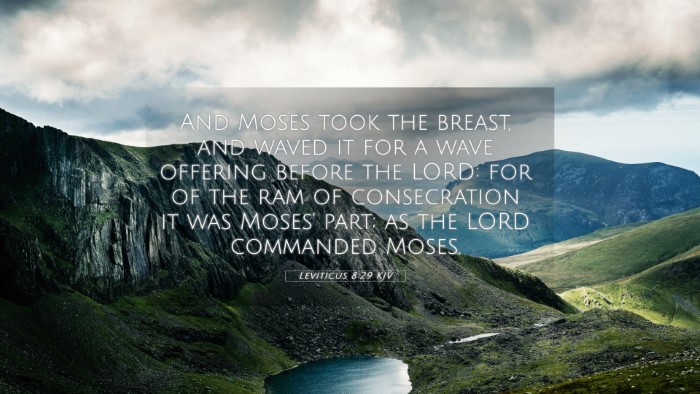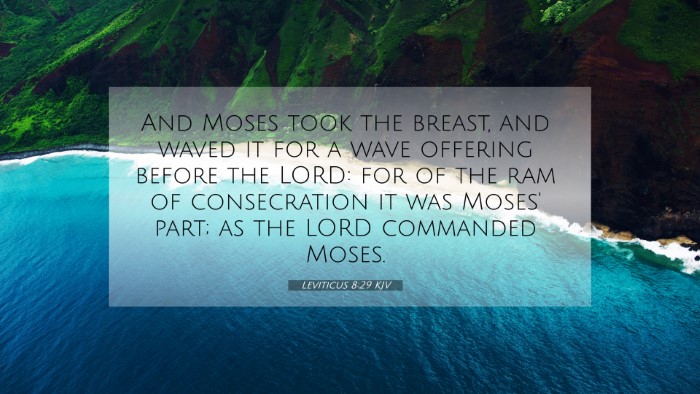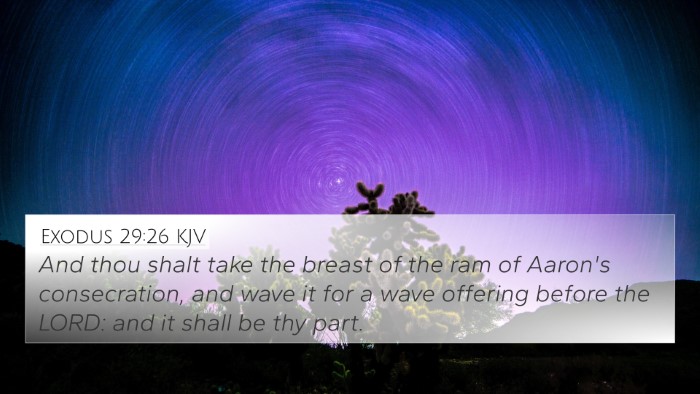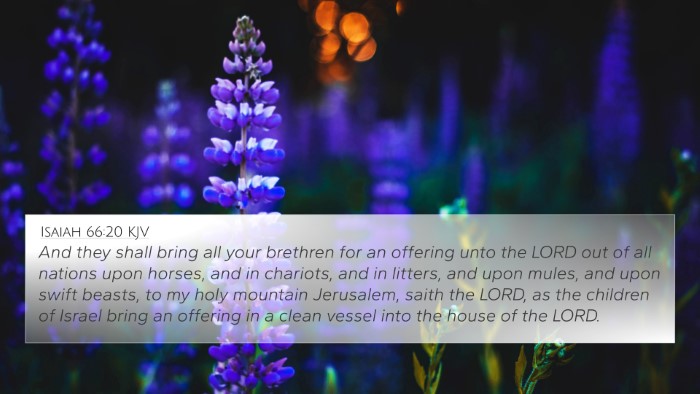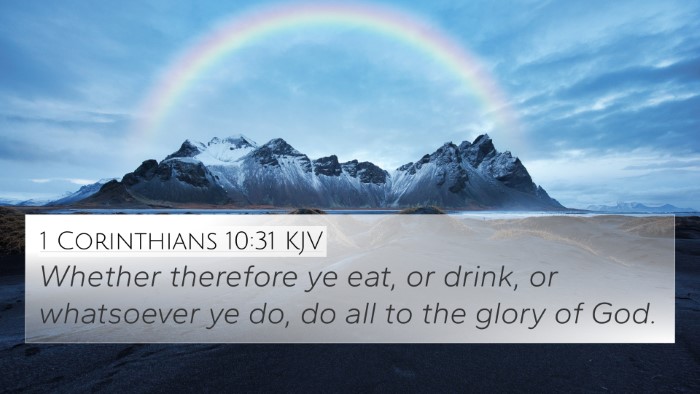Understanding Leviticus 8:29
Leviticus 8:29 states: "And Moses took the breast, and waved it for a wave offering before the Lord: for of the ram of the consecration it was Moses' part; as the Lord commanded Moses." This verse is a pivotal moment in the ordination of Aaron and his sons, highlighting the importance of ritual and symbolism in the priestly functions of ancient Israel.
Summary of Biblical Meaning
The significance of Leviticus 8:29 can be understood through several theological lenses:
- Priestly Roles and Responsibilities: This verse emphasizes the unique position of Moses in relation to the consecration of the priesthood. The act of waving the breast signifies a presentation to God, underscoring the sanctity and holiness required of those serving Him.
- Divine Command and Obedience: The phrase "as the Lord commanded Moses" underlines the necessity of obeying God's instructions meticulously. It reflects a theme present throughout Leviticus regarding the essential nature of obedience for worship and service.
- Symbolic Actions: The wave offering symbolizes the acknowledgment of God’s ownership. This action illustrates a connection of the people to God through the priesthood, reinforcing the theme of intercession central to the priestly function.
- Foreshadowing the New Covenant: The rituals performed by Moses and Aaron have rich symbolism, foreshadowing the ultimate sacrifice of Christ and the establishment of a new covenant where Christ fulfills and surpasses the Old Testament priestly system.
Commentary Insights
Renowned commentators provide valuable insights into this verse:
-
Matthew Henry: He notes the importance of the wave offering, remarking that it signifies thankfulness to God and a recognition of His ownership over the gifts we bring. It implies that all we have belongs to Him and should be dedicated to His service.
-
Albert Barnes: Barnes highlights the role of Moses in carrying out God's commands faithfully and mentions that this act of waving the breast is both an expression of praise and a part of the ceremonial rites essential for the establishment of the priesthood.
-
Adam Clarke: Clarke elaborates on the significance of the wave offering, explaining that it represents not just a gift but also a public acknowledgment of the covenant between God and His people through the priesthood.
Cross-References to Leviticus 8:29
Understanding this verse benefits from cross-referencing with other scripture passages that enhance its themes and applications. Below are key cross-references:
- Exodus 29:24-26 - Discusses the wave offering and its significance in the consecration of the priests.
- Numbers 18:11 - Outlines the priestly rights to wave offerings and other sacred gifts.
- 1 Peter 2:9 - Connects the concept of priesthood to believers in the New Testament, emphasizing their role as a chosen generation.
- Hebrews 5:4-6 - Discusses the appointment of priests and their calling, linking to Christ’s supreme priesthood.
- John 10:36 - References the sanctification of Jesus as the Son of God, paralleling aspects of the priestly ordination.
- Romans 12:1 - Invites believers to present their bodies as living sacrifices, reflecting the principles of consecration found in Leviticus.
- Colossians 1:22 - Illustrates the idea of being reconciled and presented holy before God, akin to priestly roles.
Thematic Connections and Reflections
The themes found in Leviticus 8:29 resonate through various biblical narratives:
- Holiness and Consecration: The concept of being set apart for God's service is crucial in both the Old and New Testaments.
- Divine Instruction: The repeated emphasis on following God's commands highlights the need for obedience in worship and daily life.
- Rituals and Symbolism: These elements foster a deeper understanding of God's presence and the need for reverence in approaching Him.
Practical Applications
For contemporary believers, the lessons in Leviticus 8:29 can be applied in numerous ways:
- Understanding Worship: Recognizing the importance of dedication and reverence in our worship practices.
- Embracing Our Roles: Accepting our identity as a royal priesthood charged with the responsibility of representing God to others.
- Obedience to God: Prioritizing the act of following God's commands in everyday life as a reflection of our commitment to Him.
Conclusion
Leviticus 8:29 serves as a vital reminder of the interconnection between the Old Testament sacrifices and the New Testament teachings. By exploring this verse through various commentaries and related scriptures, we deepen our understanding of its significance in the biblical narrative.
